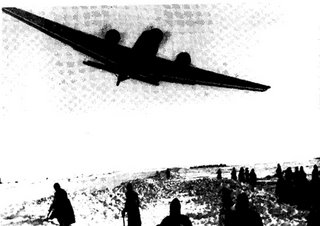 The news that almost 180 British soldiers have been recommended for gallantry awards for their efforts in Afghanistan, including "several" Victoria Crosses, brings to mind the last days of the siege of Stalingrad, when Junkers 52s from Hitler's Luftwaffe were despatched to airdrop container-loads of Iron Crosses to the beleaguered troops of the 6th Army.
The news that almost 180 British soldiers have been recommended for gallantry awards for their efforts in Afghanistan, including "several" Victoria Crosses, brings to mind the last days of the siege of Stalingrad, when Junkers 52s from Hitler's Luftwaffe were despatched to airdrop container-loads of Iron Crosses to the beleaguered troops of the 6th Army.That is not in any way to disparage the bravery of our troops but, as The Daily Telegraph remarks, the scale of the awards suggests a conflict out of all proportion to the security operation first outlined by the government when Britain committed forces to southern Afghanistan in January. John Reid, the then Defence Secretary, expressed the hope that the troops might be able to get in and out of Helmand without firing a shot.
While it is right and proper that the troops' endeavours should be properly recognised, it also has to be said that the government is getting a good deal, relying on the skill and sheer bravery of our men to make up for the pitiful inadequacies in troop numbers and equipment. Handing out medals is considerably cheaper than buying the armoured vehicles and helicopters which the Army so desperately needs.
And, if handing out medals is a cheap way of keeping troop morale high, what are we to make of the report conveyed by the BBC that Brigadier Ed Butler, the outgoing ground forces commander, is claiming that a "secret deal" has brought a halt to violence in Musa Qala, a district which had seen intense fighting.
According to the BBC's Alastair Leithead, the peace deal was struck with the elders of Musa Qala, following a "secret meeting" in the desert, since when there have been fewer number of clashes in recent days. This, Butler believes – or so we are told – is a sign that the Taleban was tactically defeated ahead of the winter. "I think we have won, we may not be quite there yet this year," he says.
This, however, simply does not match up with other reports that Taliban attacks against American forces in eastern Afghanistan have tripled since a truce was signed between the Pakistan government and pro-Taliban tribesmen in Pakistan's tribal areas, suggesting (as we indicated earlier), that the Taliban has easy access to reinforcemements.
Furthermore, the recent slacking of hostilities may have something to do with the start of Ramadan, rather than any effect British troops may have had on their enemy, which might explain why ground troops "have questioned" whether the dip in fighting is merely a sign that the Taleban is regrouping. If that is the case, the British government had better start minting some more medals.
 On the other hand, if the situation is – albeit temporarily – slackening off in Afghanistan, it seems that, after months of inactivity in Iraq, action is underway by 3,000 British troops in Basra, aimed at curbing the widespread lawlessness in the province.
On the other hand, if the situation is – albeit temporarily – slackening off in Afghanistan, it seems that, after months of inactivity in Iraq, action is underway by 3,000 British troops in Basra, aimed at curbing the widespread lawlessness in the province.However, as in Al Amarah, when the British have taken a robust line, retaliation has quickly followed in the form of roadside bombing and, given that the Army has yet to receive any of the promised armoured vehicles, they are just as vulnerable to this tactic now as they have been. There is a possibility, therefore, that a hiatus in the Afghan casualty count may be replaced by an upsurge in Iraqi losses, in which case, the medal makers are going to be busy, as there is no sign that the government is preparing substantially to increase the support and equipment to these troops.
Ironically though, even if things got to breaking point, the RAF does not have sufficient airlift capacity to emulate the Luftwaffe and air drop the medals.
COMMENT THREAD
